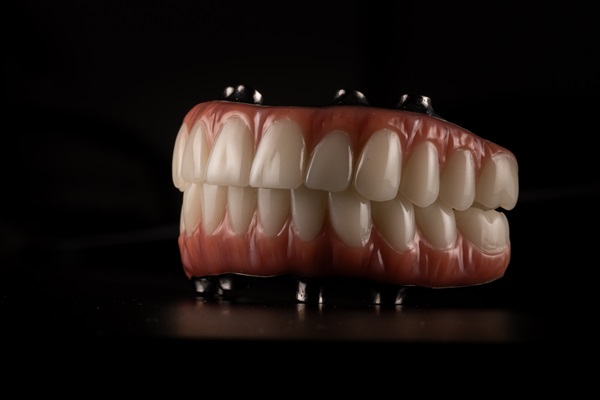Do All-on-4 Implants Have Any Side Effects?

If you’ve lost a lot of teeth and thought about getting dental implants, then you may have heard about All-on-4® implants. Like most things, though, you may be concerned that there are issues with side effects. After all, dental implants require oral surgery and putting prosthetics into your mouth, so it’s important to know whether there is potential for any side effects after getting the procedure done.
We know how scary it can be to undergo oral surgery, and that’s why in this post, we’re going to discuss the potential for side effects with these implants and the process of undergoing oral surgery. We’ll talk about the potential for side effects from the implants themselves and those associated with the process so that patients know what risks there are when opting for dental implants as a solution to tooth loss.
Do the implants cause side effects?
For patients worried about the implants themselves, you’ll be happy to know that there are no side effects to the implant itself. Like with any prosthesis, there is the potential for an allergic reaction to the materials used, but these risks are incredibly rare, and the side effects from such a reaction would be minimal.
All materials used are high-quality dental and medical-grade components that are safe for use on humans, so you’ll never have to worry about harmful effects from your new teeth once they are installed.
What are the side effects of the surgery?
There are always some side effects from having oral surgery, but they should be minimal and go away within a few days with the proper care. To help understand some of the potential side effects, we will break them down into categories to detail what to expect before, during, and after the procedure and how to mitigate any reactions to the surgery.
Pre-surgery
Before the surgery, there is no special prep or procedures that need to be done. The dentist will examine you to make sure you are a good candidate for All-on-4 dental implants and identify any potential existing or underlying oral health issues that may cause complications with the installation of the implants.
Once a patient is given a clean bill of health, they can move on to the actual installation. If teeth need to be removed before installing the implants, the dentist will wait roughly three months before installing the implants to allow for healing.
During surgery
There are no known side effects from the surgery itself. The patient will be put under for the procedure, and in very rare cases, patients have allergic reactions to anesthesia. This should be addressed by the dentist and the anesthesiologist during the pre-surgery preparation, however, so there should be no concern for potential side effects from the surgery itself.
Post-surgery
Post-surgery is when you will experience the side effects of the implant installation. The side effects are minimal and typical of any oral surgery in most cases.
You should expect mild side effects for a few days to a few weeks after the surgery. First, depending on the type of anesthesia used, you may experience grogginess for up to one whole day after the surgery.
Once sedation wears off, it is normal to experience some bleeding at the implant installation site. The bleeding should be managed by inserting gauze, and the gauze should be changed every few hours. You will likely experience some pain and discomfort around the affected area with the bleeding. This, too, is normal and should only last a few days.
Lastly, you will also experience tenderness, bruising, and swelling around the surgery area. This should be managed with pain medication prescribed by your dentist and should stop after a few days.
Contact your dentist today
Now that you know there are very few side effects from having All-on-4 implants installed to replace your missing teeth, the time is now to talk with your dentist and see if you are a candidate for this permanent full mouth tooth restoration procedure. Suppose you are a candidate for this procedure; you can expect to have an entire mouth of teeth restored in less than a year, sometimes in as little as three months.
With these implants, you’ll be able to smile confidently again and go back to enjoying the foods you love without ever worrying about your teeth again. Talk to your dentist today to learn more about what this product can offer you and your smile.
Request an appointment here: https://drdavidbrumbaugh.com or call R. David Brumbaugh, DDS at (214) 306-4402 for an appointment in our Dallas office.
Check out what others are saying about our dental services on Yelp: All-on-4 Dental Implants in Dallas, TX.
Related Posts
For people dealing with significant tooth loss or dental damage, All-on-4® dental implants can be an excellent solution. This treatment option allows patients to restore multiple teeth without using an individual implant for each tooth. Instead, four dental implants are strategically placed within the dental arch to secure a dental prosthetic that replaces the entire…
You may have heard a lot about dental implants and how they can change your smile and appearance. Implants have many benefits and offer advantages that other tooth-replacement treatments cannot match. You can expect improved health and wellness when you have implants, as well. One of the most significant differences you will see is in…
Today, many people are choosing dental implants to treat severe damage and tooth loss. This procedure is often preferred to other alternatives because it offers natural-looking results that usually last a lifetime. However, it is necessary to properly care for implants, especially during the first few weeks after surgery.For many people, dental implants require multiple…
Dental implants are a popular choice for patients wanting to replace missing teeth. Formerly, partial dentures and dental bridges were the go-to treatments. However, implants have many advantages. They are more stable than removable dentures and typically last longer than bridges. Using this prosthesis, a dentist can replace a single missing tooth without disturbing any…


